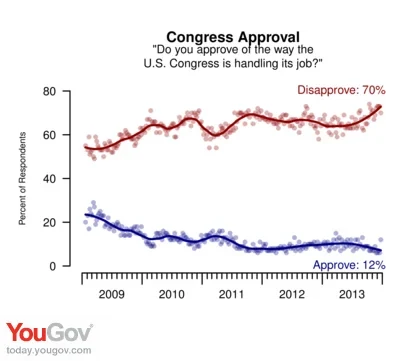Most Americans won't remember 2013 fondly, but people are happier about this year than they were last year or in the aftermath of the financial crisis.
Put simply, most Americans are happy to see 2013 go. In the latest Economist/YouGov Poll, more than two-thirds view the year as one that was bad for the world; more than four in ten say it was a bad year for their family.
In fact, 60% of Americans plan to stay up until midnight to watch the old year end – although this is more likely to be a young person’s plan. 77% of adults under 30, but just a third of senior citizens, will be awake to make sure 2013 finally goes into history.
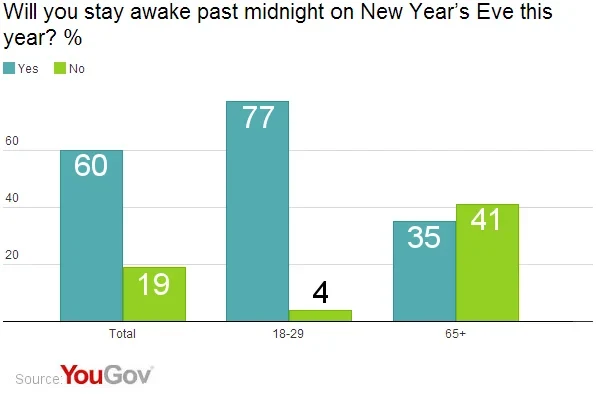
The public sees the world – and many also see themselves personally – as having not just had a tough 2013, but having had a hard time for the last few years. At the end of 2012, 69% said it had been a bad year for the world. If there is any consolation, the public has seen some progress: when they assessed 2009, the first year of President Obama’s first term, their opinion was worse. More than eight in ten say that 2009 had been a bad year for the world.
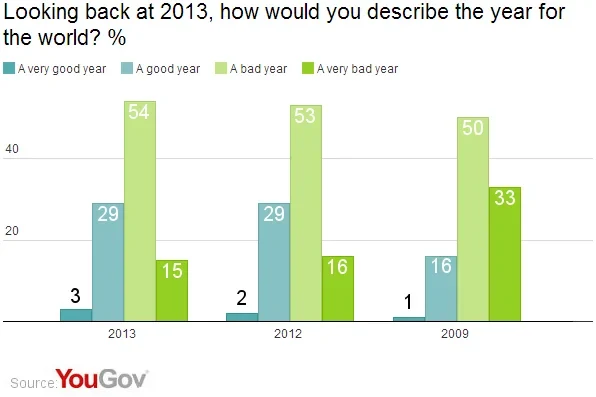
Global assessments are often political in nature. And this is case here. Although all groups are more negative than positive when assessing the state of the world, Republicans are especially negative. Only 13% of Republicans say 2013 has been a good year for the world.
There are almost no issues where a majority of Americans have seen improvement. Only a quarter say health care coverage is better today than it was a year ago; more than half say it has gotten worse, reflecting the continued poor assessments given to the Administration’s health care reform (in this week’s Economist/YouGov poll, for example, a majority continues to call it a failure, and nearly half think it should be repealed).
However, even though the continued withdrawal of U.S. troops from Afghanistan has not translated into a positive assessment of American involvement there, things do look better than they did four years ago. Although 31% describe the situation in Afghanistan as worse today than it was a year ago, 60% viewed things as getting worse there at the end of 2009.
When it comes how 2013 impacted American families, the year looks better, although it’s hard to describe things as especially good. The slow economic improvement and the incrementally dropping unemployment rate haven’t registered with everyone. A majority does admit that last year was a good one for their families – although fewer than one in ten would say it was a very good year. Opinions a year ago looked about the same. But at the end of 2009, a majority of Americans thought their families had a bad year. For one in five in 2009, it had been very bad.
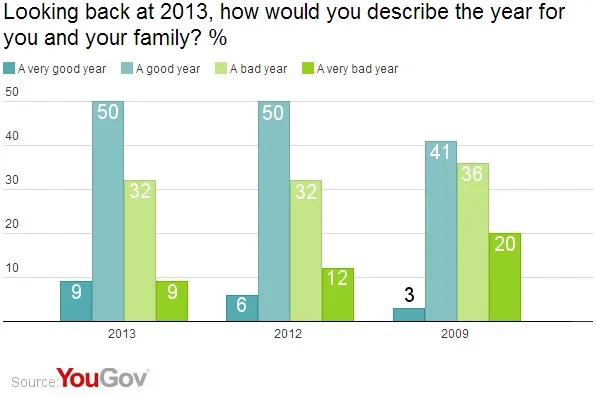
Young adults are the most positive about 2013 for themselves and for the world. Nearly three in four of those under 30 think this has been a good year for their families; almost half say it has been a good year for the world. And income matters a lot when judging a family’s success: barely half with incomes under $40,000 a year say this has been a good year for their families, compared with 72% of those with incomes over $100,000 a year.
This slow, incremental and almost imperceptible economic improvement is clear when one looks at how Americans rate their family’s financial situation compared to a year ago: 33% say they are worse off than they were a year ago; only half as many, 16% say their family is better off financially today. But that is still an improvement from four years ago. Then, four times as many (47%) said things had gotten worse for their family in 2009 as said the family’s finances had improved (12%).
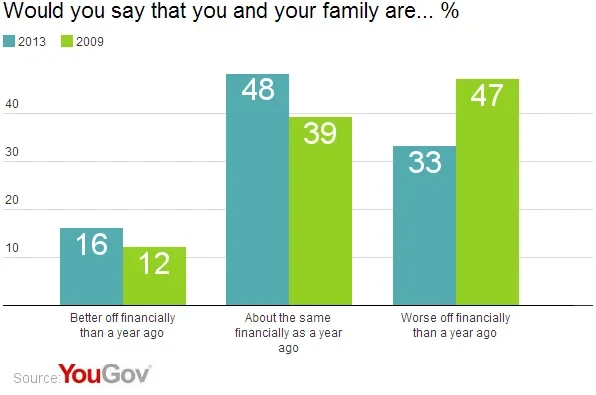
Americans now have had multiple years viewing government leaders, and not just those in the current Administration, negatively. George W. Bush’s approval rating in Gallup polls dropped below 50% less than a year after he began his second term, and continued a decline through the rest of his presidency. In Economist/YouGov Polls, President Obama’s disapproval rating has been higher than his approval rating for most of his presidency: only for his first year in office and for a time around his re-election in 2012 has that not been the case.
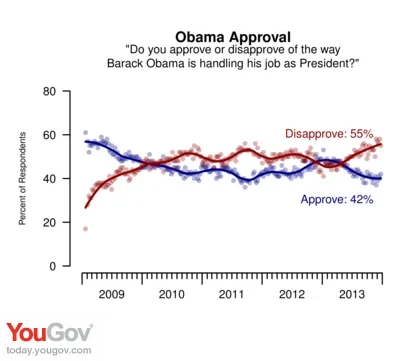
One year ago, just over a month after Barack Obama was re-elected, approval outweighed disapproval, though narrowly. 49% approved, 43% disapproved. Today, 42% approve, 55% do not. That actually represents a small improvement from assessments in late October and November, after the partial government shutdown and the troubled rollout of the Obamacare website.
Evaluation of the website has improved, though it still negative: at the end of last month, 62% of those who had visited the website described their experience negatively. In this week’s poll, the percentage rating their experience negatively has dropped nine points. Of course, most site visitors are still evaluating their experiences in October and November before the site was revamped.
As for Congress, which finally passed a budget last week, 61% still say it has accomplished less than a Congress usually does in a year. But there has been an ever-so-small numerical improvement in how the public looks at Congress. Perhaps it’s the holiday spirit, but 12% now approve of the way Congress is handling its job, double the 6% that did so a week ago.
